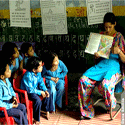Current education system has forgotten
the aims and objectives of education
The objectives of education :
1. The basic objective of education is to provide knowledge.
2. Knowledge is that which eliminates your sorrows and gives you constant bliss.
The things to be achieved by education :
1. Providing knowledge and intellectual progress.
2. Acquiring skill and perfection in one’s profession.
3. Development and preservation of moral values.
4. Developing an ideal personality.
5. Preserving our cultural heritage and passing it on to the next generation.
6. Providing guidance to children about what our goals should be in life and how to achieve them.
7. Raising children to become ideal citizens.
Current education system
Helping the intelligent students get good marks and becoming doctors, engineers or officers; without guaranteeing a happy and contended life : Nowadays, children as well as their parents are concerned only about scoring higher marks in the examination and getting admission into medical or engineering college or other similar professional courses. Even the society grades the educational institutes on the basis of the highest percentage achieved. To achieve this goal of attaining good marks, the teachers make the students solve more question papers, arrange extra classes outside school hours, give notes, etc. However, even if intelligent children study hard and become doctors, engineers or get some high post in a big company, there is no guarantee that they will be happy and contented.
According to Bharatiya (Indian) culture, every action is to be done within the framework laid by the Dharma : In earlier times, the students used to go to Guru’s place to learn about Dharma after their ‘thread ceremony’. There, they used to learn that Dharma (Righteousness), Artha (Wealth), Kama (Desire) and Moksh (Final liberation) are the 4 goals of life. Bharatiya culture teaches that every action is to be done within the boundaries of the framework laid down by Dharma.
The main points to be remembered by the teachers after they start considering teaching as a Spiritual practice
Set an example before the students : Instead of just giving advice to the students, the teachers should set an example by themselves behaving in an ideal manner. This is because the students try to imitate all actions of their teacher and behave accordingly.
The teacher should mould the students through his actions : No matter how good the lectures are, their correctness can always be debated. However, good action can never be opposed or debated. Hence, the teacher has to mould the students through his actions. For example, if another teacher or a senior authority of the school enters the class, the teacher instructs the students to pay salutation to him/her, but the teacher himself does not pay salutations. Here, instead of just instructing the students, if the teacher himself pays salutation to the concerned authority, the students too will follow suit.
While telling the students to do extra reading, if the teacher tells some points from a book, then the students will also become more interested in doing extra reading.
Two ways of teaching
Theory : Teach by reading the topic from the textbook and explaining the same to the students by writing on the blackboard or try to explain it by preparing notes of that topic. The former is used more often nowadays.
Practical : The students will be able to grasp the topic better if the teacher teaches them by giving practical examples based on the topic being taught.
Tell some moral stories to the students
The teacher should try to make every aspect in the class spiritual; only then will it be possible to inculcate moral values among students along with knowledge. The teacher can achieve both, that is inculcating good values and providing knowledge to students through entertainment. For example, while teaching about types of food i.e. liquid food and solid food from the textbook, the teacher should try to make the teaching spiritual and explain to the students the difference between sattvik (Sattva oriented; positive and pure) food and tamsik (Tama oriented; negative) food and the effects that each of them have on our thoughts.
The right age at which to imbibe
appropriate impressions and values
It is better to start imbibing good impressions in the minds of children at a younger age. It is necessary to imbibe the appropriate impressions, so that the children have good thoughts and actions. The teacher should know that schooling age is the most appropriate age for imbibing right impressions and he should act accordingly. If the teacher does this, then he can settle the debt of the society. If the teacher does his work as his duty then his teaching will become a spiritual practice. Remember, giving knowledge is superior to donating food or gold.
Hobby
A hobby is something that is done in spare time, for fun and out of interest, not for any monetary gain. Students should be encouraged to take up some hobby depending on their interest. This will keep them occupied in their free time, and thus keep their mind peaceful and make their life blissful. To do all this, the teacher will have to do penance, that is, spiritual practice.
– Mrs. Vandana Karache (Teacher), Pimpari, Pune.

 Responsibilities of Teachers !
Responsibilities of Teachers ! Stress free teaching for a cultured generation !
Stress free teaching for a cultured generation ! Only teachers can develop a Cultured generation !
Only teachers can develop a Cultured generation ! Present education system and duty of a teacher
Present education system and duty of a teacher Need to rekindle the self-confidence in Students
Need to rekindle the self-confidence in Students